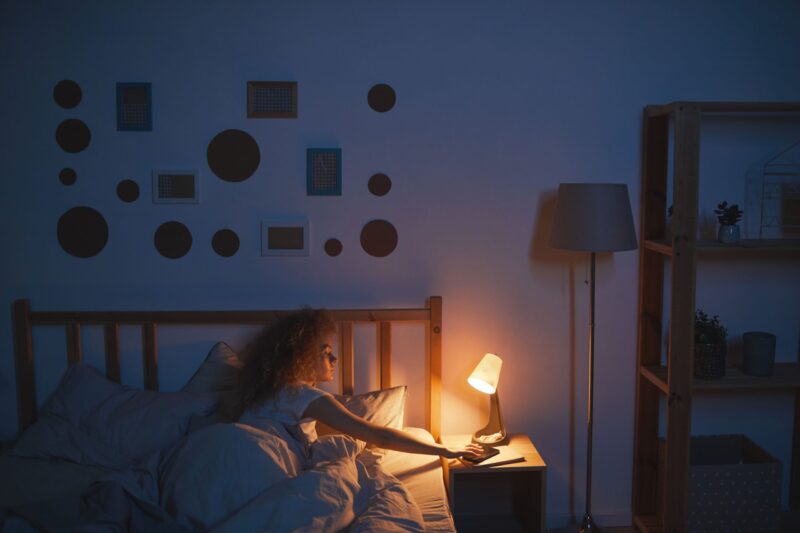Getting a good night’s sleep is about more than just turning off the lights. The quality of rest is shaped by what you do in the hour or two before bed.
A structured night routine helps the body wind down, signals to the brain that it’s time to sleep, and reduces the stress that often lingers at the end of a busy day.
Instead of leaving your evenings to chance, you can design habits that train your body to relax and prepare for deep, restorative sleep.
Why an intentional night routine matters

Sleep doesn’t start the moment you close your eyes. It’s a process that depends heavily on your pre-bed behavior.
Exposure to light, food choices, levels of stress, and even the type of conversation you have at night all influence how quickly you fall asleep and how deeply you stay there.
A consistent night routine sets cues for your internal body clock. When you repeat certain actions in the same order each night, the brain begins to recognize them as “sleep signals.”
Over time, this helps regulate your circadian rhythm, making it easier to drift off naturally and wake up refreshed without needing multiple alarms.
Making your environment part of the ritual
One of the simplest but most effective steps is adjusting your sleep environment. Your bedroom should feel like a sanctuary, free from clutter and unnecessary stimulation.
Soft lighting helps signal to the body that evening has arrived. Using dim lamps instead of bright overhead lights can ease the transition to bedtime.
Comfort also plays a big role. The right pillow and bedding are not small luxuries, they’re investments in your health.
For example, some people find comfort in a dakimakura pillow, which provides full-body support and can help reduce strain on the back or hips.
Having an item that enhances relaxation not only makes falling asleep easier but also reduces the chance of tossing and turning throughout the night.
Building a consistent wind-down routine

A night routine should be predictable but not rigid. The point isn’t to add stress with strict timing, but to create a series of calming actions that help you mentally and physically slow down.
Some effective activities to include are:
- Reading a few pages of a book (paper, not a phone screen)
- Listening to calm music or a sleep-focused podcast
- Practicing gentle stretching or light yoga
- Writing down lingering thoughts in a journal to clear your mind
Repeating a few of these activities every evening creates a mental signal that the day is closing. Over time, even the act of opening your book or rolling out your yoga mat will trigger a sense of calm and readiness for rest.
Managing light and technology before bed
Screens are one of the biggest barriers to quality sleep. The blue light they emit tells your brain that it’s still daytime, suppressing melatonin production and making it harder to feel drowsy.
If you regularly scroll through your phone or watch TV right before bed, you’re essentially working against your natural sleep cycle.
To counter this, consider setting a “digital curfew.” Power down devices 30–60 minutes before you want to sleep.
If you need to use a phone or computer in the evening, use blue light filters or glasses that minimize its impact.
Replacing late-night screen time with analog activities like sketching, journaling, or reading can make a noticeable difference in how quickly you fall asleep.
Nutrition and hydration’s role in sleep

What you eat and drink in the evening has a direct effect on your night’s rest.
Heavy meals, caffeine, and alcohol close to bedtime can disrupt your sleep cycle. Instead, aim for lighter dinners and avoid stimulants at least 6 hours before bed.
If you tend to feel hungry before bedtime, try a small, balanced snack.
Foods that combine protein with complex carbohydrates, such as a banana with almond butter or a small bowl of oats, can prevent hunger without disturbing digestion.
Hydration is also important, but it’s best to avoid large amounts of liquid right before lying down to reduce sleep interruptions.
Stress management as part of the evening
Even if your room is perfectly dark and your bedding is comfortable, stress can keep you awake for hours.
That’s why stress management should be built into your routine. Practices like meditation, breathwork, or journaling can help release the tension of the day.
You don’t need a long session. Even five minutes of intentional deep breathing lowers heart rate and calms the nervous system.
Pairing this with a warm shower or bath further relaxes muscles, enhances circulation, and tells your body that sleep is approaching.
Anchoring your routine with consistency
Consistency is the glue that holds all these practices together. Going to bed and waking up at roughly the same time every day helps regulate your body’s internal clock.
While occasional exceptions are normal, keeping a steady rhythm throughout the week strengthens sleep quality.
Think of your routine as a series of cues. Dim lights mean bedtime is near. Reading a chapter tells your brain to slow down.
Laying down with the same pillow or blanket signals that sleep is next. When repeated regularly, these actions become automatic triggers that reduce the effort needed to fall asleep.
Practical tips for starting tonight

Creating a night routine doesn’t require a complete lifestyle overhaul. Start with small, manageable changes and build from there.
- Pick one consistent bedtime and aim to stick with it.
- Choose two relaxing activities you can realistically do each night.
- Limit phone use in the last hour before sleep.
- Make small adjustments to your environment, such as dimming lights or tidying your space.
- Track your sleep quality over a couple of weeks to see what makes the biggest difference.
As you refine your routine, you’ll notice which practices feel natural and which feel forced. Keep the ones that genuinely help you relax and let go of those that add stress.
Final thoughts
Better sleep doesn’t come from a single trick or product but from the combination of consistent, supportive habits.
A personalized night routine signals to your body and mind that the day is ending and rest is near.
By creating the right environment, limiting late-night stimulation, supporting your body with comfort and nutrition, and making stress relief part of the process, you give yourself the best chance at deep, refreshing sleep.
What begins as a series of small steps quickly becomes a ritual you look forward to each night.
And with time, you’ll notice mornings feel lighter, focus sharpens, and the daily grind becomes more manageable because your body is finally getting the rest it deserves.

